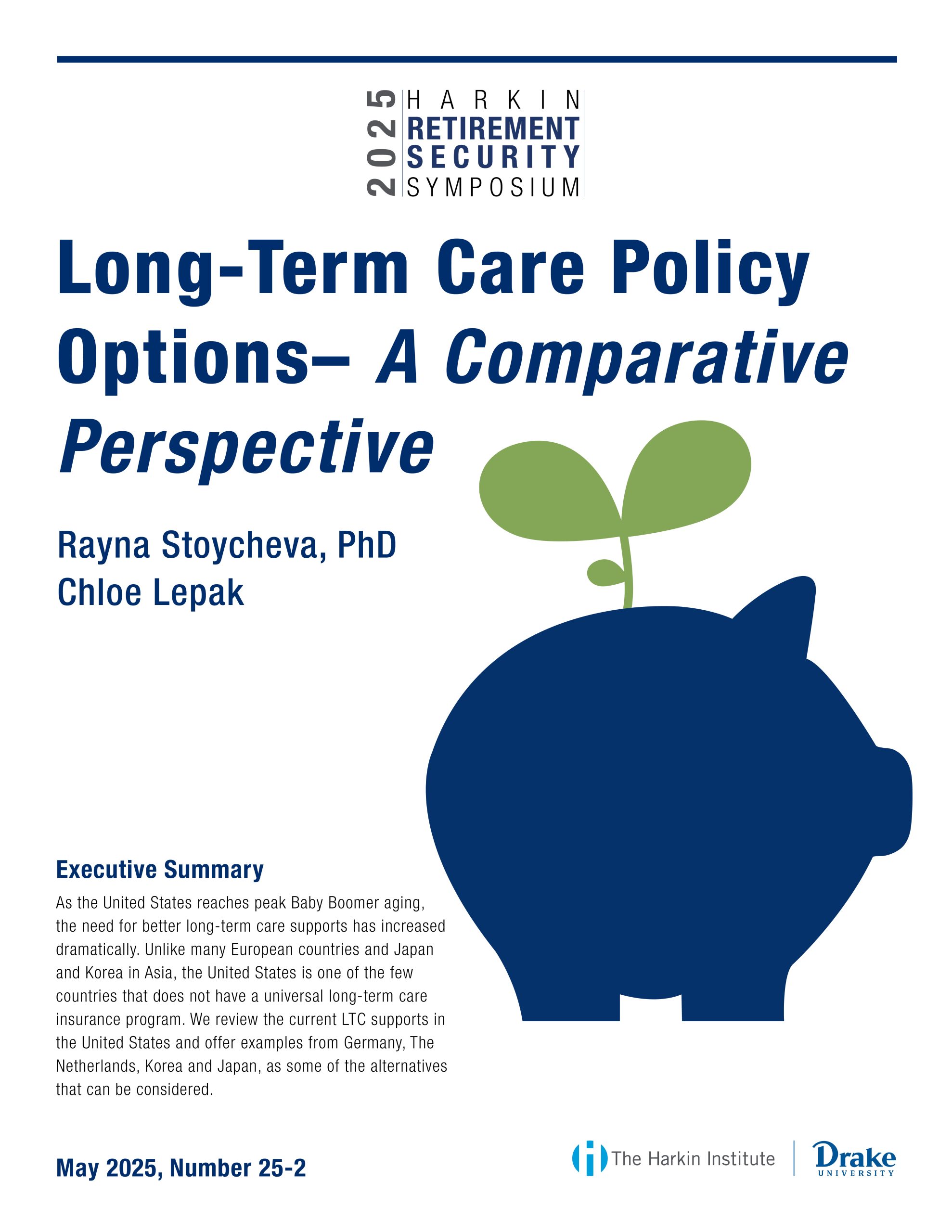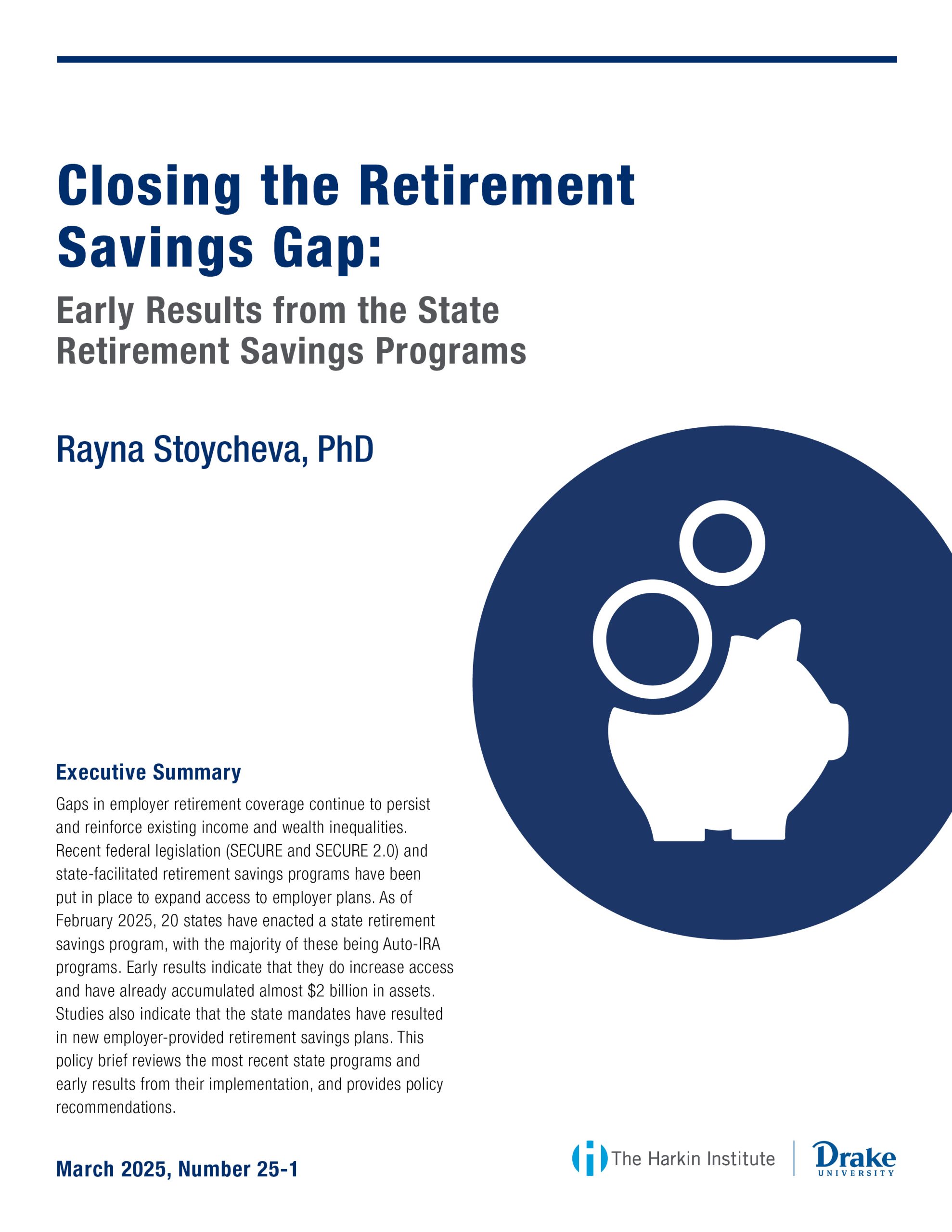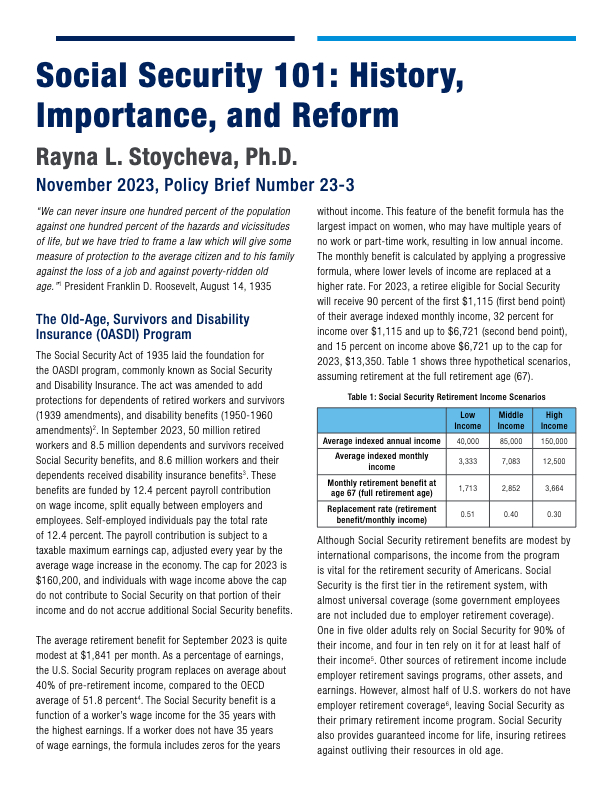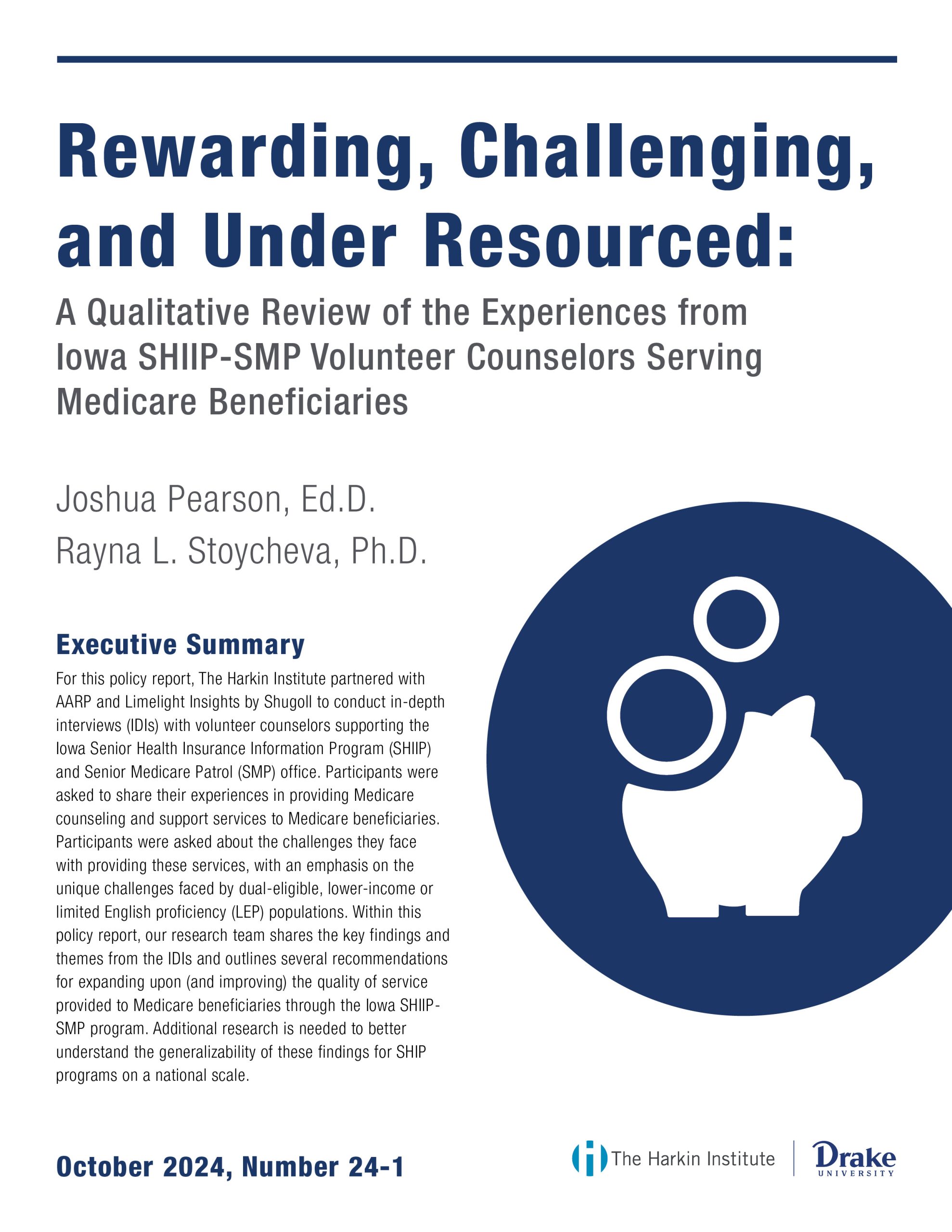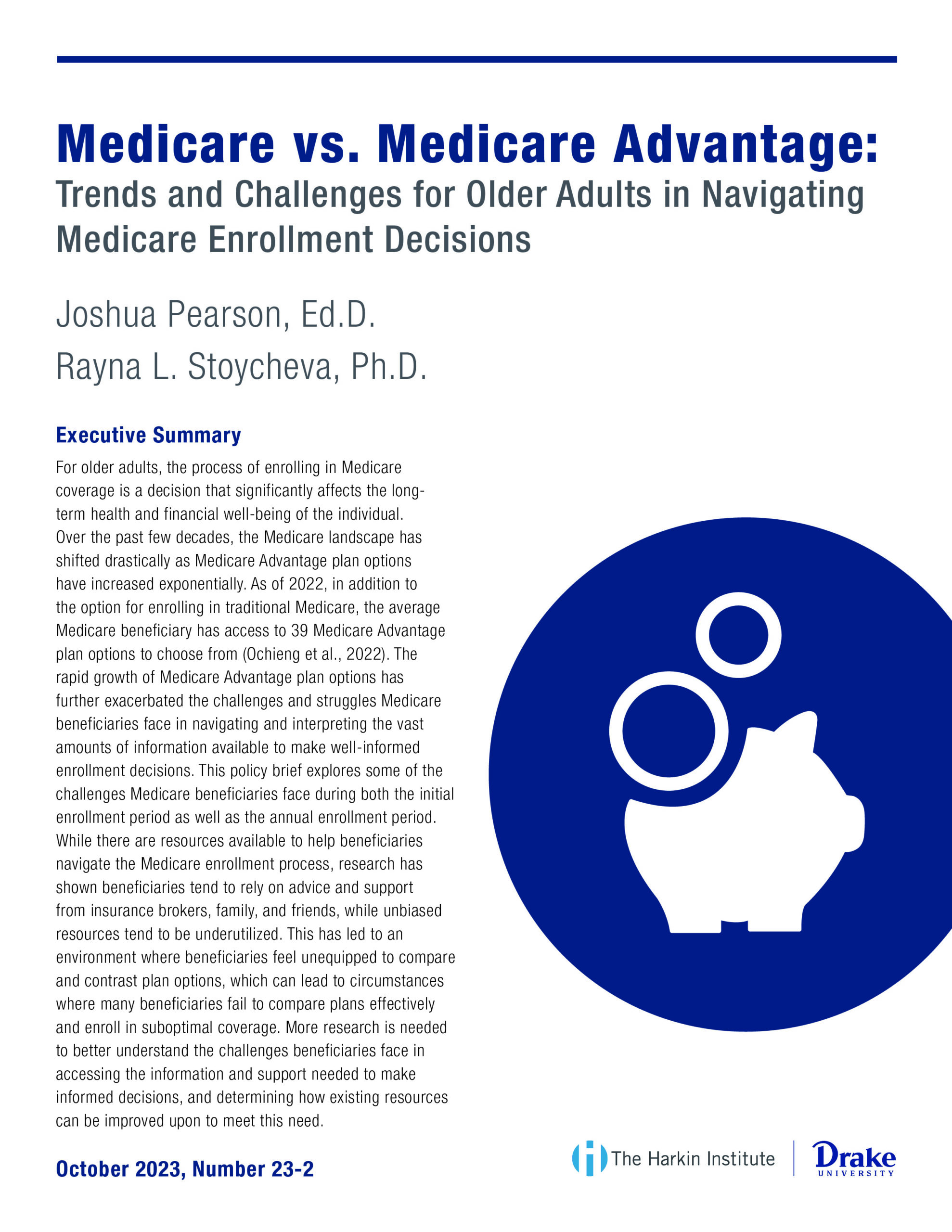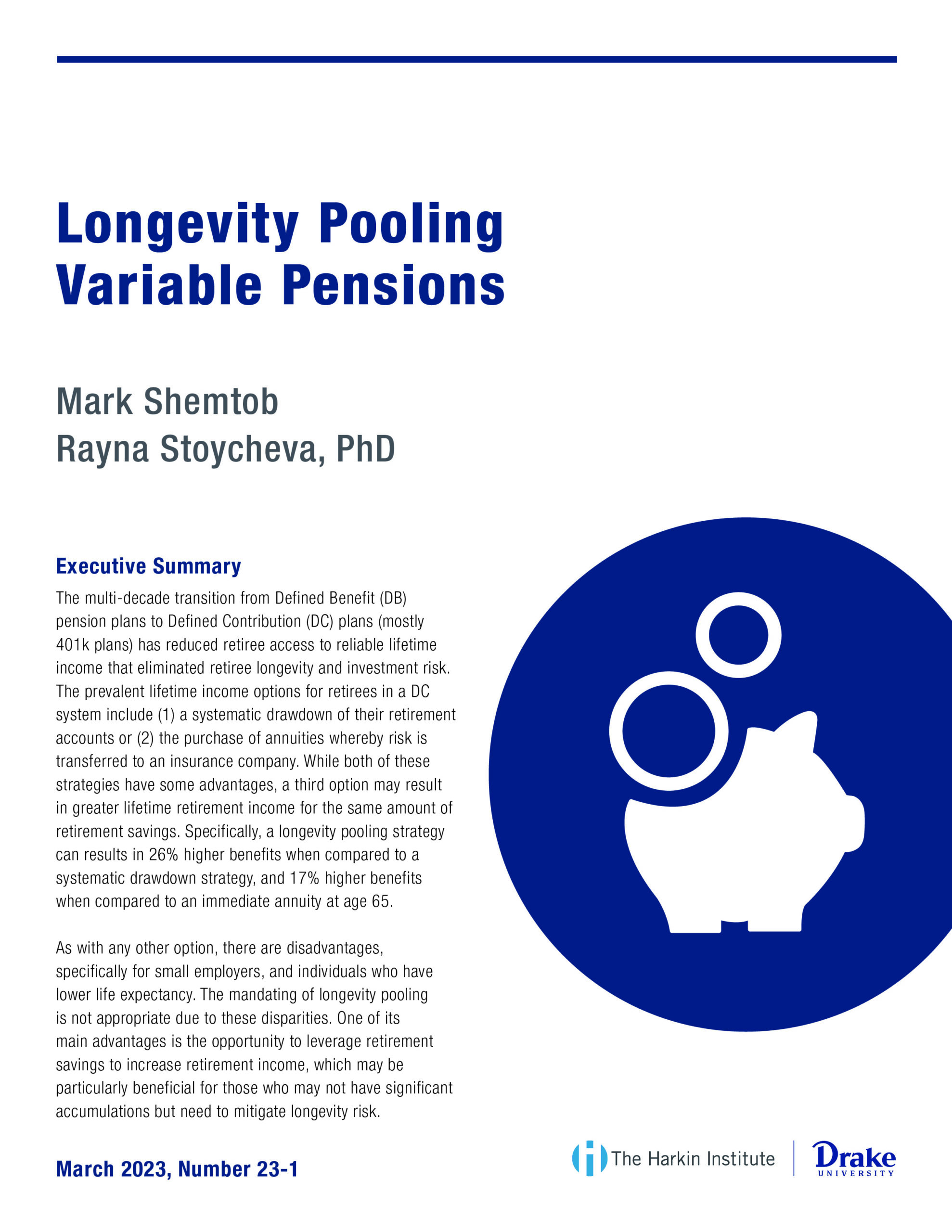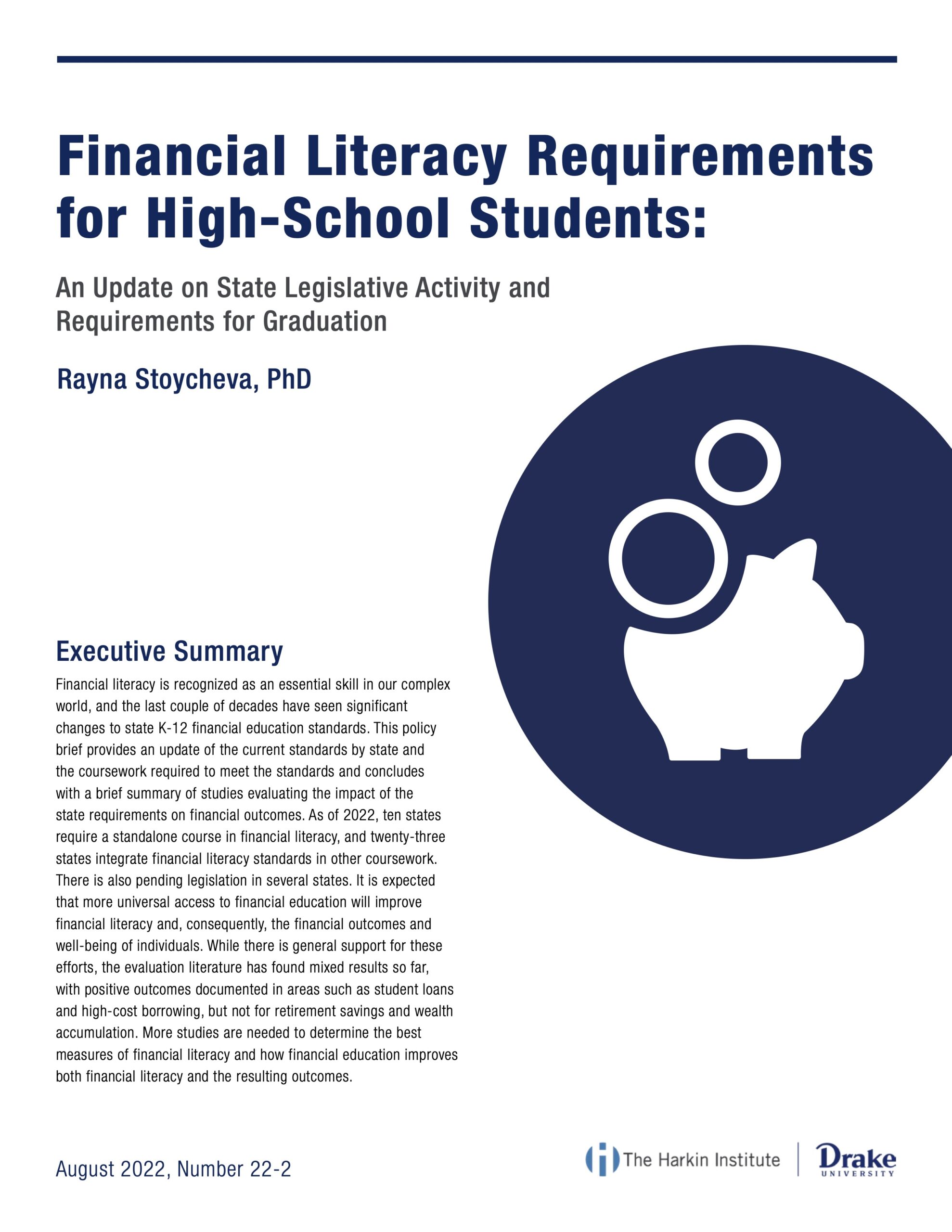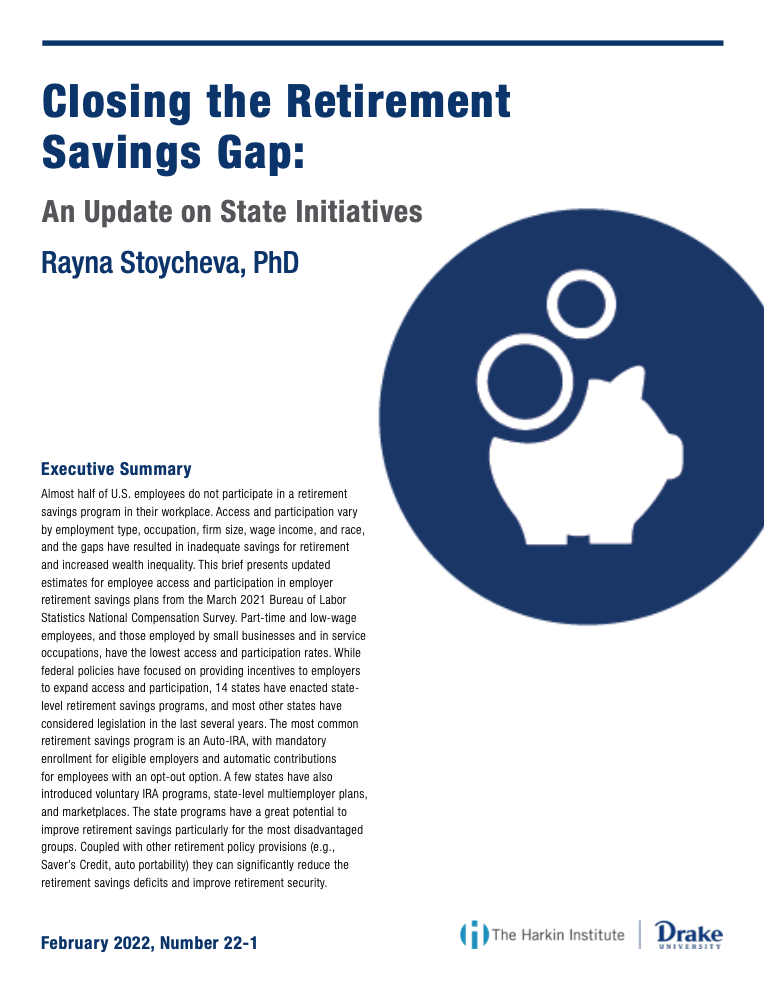Retirement Security
Our vision is to create solutions that ensure every American can retire with dignity.
What’s Happening Now
We connect policy makers, advocacy groups, researchers, and citizens working to build an inclusive retirement system. We focus on access, adequacy, retirement preparedness, and financial literacy.
The Core Advisory Committee on Retirement Security identified key policy issues to be addressed through research and events. Our current work focuses on access and adequacy of retirement savings, inequality in retirement preparedness, and financial literacy. The annual retirement security symposium is tailored to address contemporary legislative policy changes and brings together researchers and policy makers. We partner with other organizations to co-host events related to retirement security, such as the Iowa Jump$tart Coalition financial literacy competitions for high-school students.
Recent Retirement Security Events
Long-Term Care Policy Options: State, National, and International Perspectives
May 22, 2025
The cost of long-term care has nearly doubled from the early 2000s to 2024, both for at home care and nursing home care. These costs are out of reach for everyone except the wealthiest households. Long-term care costs are internalized by caregiver families in some combination of the following: diminished or lost earned income, early retirement, direct caregiving expenditures, and mental and physical health issues. There are a variety of policy options to address this economic burden on families across the income distribution. This free webinar features a panel of leading experts on LTC policies to learn more about current state, national, and international policies addressing long-term care needs.
Past Retirement Security Events
Closing the Retirement Savings Gap Webinar
April 2, 2025
This webinar featured a panel of experts presenting updates on the progress of the state retirement savings programs, designed to increase access to retirement savings for employees who do not have employer plans. The webinar looked at recent studies examining the impact of these programs on retirement savings, private market retirement plan coverage, and potential interactions with other policies due to asset limits.
Navigating Medicare Enrollment with Iowa SHIIP Counselors
This webinar featured the results from a qualitative study with Iowa SHIIP counselors, who provide retirees with advice about Medicare enrollment. The Harkin Institute partnered with the Iowa SHIIP-SMP program and AARP for this project, focused on understanding the main challenges faced by retirees in navigating the Medicare enrollment process. The SHIP program provides unbiased advice about Medicare options to retirees through in-person counseling, including telephone, virtual, and face-to-face appointments. It is a particularly important source of information for those who face technological, physical, or language barriers. We sought to understand barriers for vulnerable groups, such as dual-eligible, low-income, and limited English proficiency retirees, in addition to the overall counselor experience with the program. This research is part of a larger research project focused on the financial impact of health insurance on retirees.
2024 Harkin Retirement Security Symposium
Whether you’re budgeting for the present or planning for your retirement, managing your finances can be an overwhelming task. That’s why The Harkin Institute chose “Navigating the Journey to Financial Wellness” as the theme for the 2024 Harkin Retirement Security Symposium. The event brought together advocacy and community organizations, government agencies, and private companies and their foundations that work on financial wellness and retirement security. The symposium provided a forum to discuss the most pressing challenges and find collaborative opportunities to address documented financial wellness needs and their relationship to retirement security, with an emphasis on vulnerable populations.
2023 Harkin Retirement Security Symposium
The first-ever Harkin Retirement Security Symposium was held in 2023. The theme of the event was “Preserving and Enhancing Social Security for All.” The event convened experts actively working on Social Security reform, research, and legislation, many of whom represent the most prestigious research and policy institutions in the country. Speakers covered a variety of topics, including restoring balance to Social Security, improving the economic security for working families, the status of older workers and retirement, and public opinion on Social Security reform and the legislative agenda. Attendees had the opportunity to engage in important conversations, make valuable connections, and delve deeper into issues that affect us all.
Reports and Resources
Long-Term Care Policy Options– A Comparative Perspective
As the United States reaches peak Baby Boomer aging, the need for better long-term care supports has increased dramatically. Unlike many European countries and Japan and Korea in Asia, the United States is one of the few countries that does not have a universal long-term care insurance program. We review the current LTC supports in the United States and offer examples from Germany, The Netherlands, Korea and Japan, as some of the alternatives that can be considered.
Closing the Retirement Savings Gap:
Early Results from the State Retirement Savings Programs
Americans rely on a mix of Social Security benefits, employer retirement plan benefits, and earnings to support themselves during retirement. However, around 30% of private sector workers do not have access to a retirement savings plan, and only slightly more than half of all workers participate in one. In the last decade, almost every state has either considered or enacted legislation to establish state-facilitated retirement savings programs in an effort to make sure more workers have access to employer retirement plans.
This new brief looks at recent studies examining the impact of these state retirement savings programs on access and accumulation, as well as their interaction with private market retirement plan coverage, and potential interactions with other policies due to asset limits.
Social Security 101: History, Importance, and Reform
This brief provides an overview of the OASDI program and discusses its importance for the retirement security of all Americans, and major alternatives to balance the trust fund. This brief was originally published as part of the 2023 Harkin Retirement Security Symposium Follow Up Report.
Rewarding, Challenging, and Under Resourced:
A Qualitative Review of the Experiences from
Iowa SHIIP-SMP Volunteer Counselors Serving Medicare Beneficiaries
For this policy report, The Harkin Institute partnered with AARP and Limelight Insights by Shugoll to conduct in-depth interviews (IDIs) with volunteer counselors supporting the Iowa Senior Health Insurance Information Program (SHIIP) and Senior Medicare Patrol (SMP) office. Participants were asked to share their experiences in providing Medicare counseling and support services to Medicare beneficiaries. Participants were asked about the challenges they face with providing these services, with an emphasis on the unique challenges faced by dual-eligible, lower-income or limited English proficiency (LEP) populations. Within this policy report, our research team shares the key findings and themes from the IDIs and outlines several recommendations for expanding upon (and improving) the quality of service provided to Medicare beneficiaries through the Iowa SHIIP-SMP program. Additional research is needed to better understand the generalizability of these findings for SHIP programs on a national scale.
Medicare vs. Medicare Advantage: Trends and Challenges for Older Adults in Navigating Medicare Enrollment Decisions
This policy brief explores some of the challenges Medicare beneficiaries face during both the initial enrollment period as well as the annual enrollment period. While there are resources available to help beneficiaries navigate the Medicare enrollment process, research has shown beneficiaries tend to rely on advice and support from insurance brokers, family, and friends, while unbiased resources tend to be underutilized. This has led to an environment where beneficiaries feel unequipped to compare and contrast plan options, which can lead to circumstances where many beneficiaries fail to compare plans effectively and enroll in suboptimal coverage. More research is needed to better understand the challenges beneficiaries face in accessing the information and support needed to make informed decisions, and determining how existing resources can be improved upon to meet this need.
Longevity Pooling Variable Pensions
The multi-decade transition from Defined Benefit (DB) pension plans to Defined Contribution (DC) plans (mostly 401k plans) has reduced retiree access to reliable lifetime income that eliminated retiree longevity and investment risk. The prevalent lifetime income options for retirees in a DC system include (1) a systematic drawdown of their retirement accounts or (2) the purchase of annuities whereby risk is transferred to an insurance company. While both of these strategies have some advantages, a third option may result in greater lifetime retirement income for the same amount of retirement savings. Specifically, a longevity pooling strategy can results in 26% higher benefits when compared to a systematic drawdown strategy, and 17% higher benefits when compared to an immediate annuity at age 65.
As with any other option, there are disadvantages, specifically for small employers, and individuals who have lower life expectancy. The mandating of longevity pooling is not appropriate due to these disparities. One of its main advantages is the opportunity to leverage retirement savings to increase retirement income, which may be particularly beneficial for those who may not have significant accumulations but need to mitigate longevity risk.
Financial Literacy Requirements for High-School Students: An Update on State Legislative Activity and Requirements for Graduation
Financial literacy is recognized as an essential skill in our complex world, and the last couple of decades have seen significant changes to state K-12 financial education standards. This policy brief provides an update of the current standards by state and the coursework required to meet the standards and concludes with a brief summary of studies evaluating the impact of the state requirements on financial outcomes.
Closing the Retirement Savings Gap
Half of U.S. employees do not participate in a retirement savings program in their workplace. Part-time and low-wage employees, and those employed by small businesses and in service occupations, have the lowest access and participation rates. This brief examines the role of state retirement savings programs in addressing this problem.
The Harkin Legacy
Along with introducing and supporting bills to protect retirees, Sen. Harkin served as chairman of the Senate Committee on Health, Education, Labor, and Pensions (HELP). He worked to reduce the $7.7 trillion (as of 2015) retirement deficit by strengthening the two-tiered system of public retirement and private pensions. Highlights of Sen. Harkin’s work in retirement security include:
Protecting Public Retirement Plans
In the 1990s, 2002, and 2005, Sen. Harkin helped lead the fight against Social Security privatization and sponsored legislation to strengthen the system and expand benefits, including the Strengthening Social Security Act of 2013, which would prepare a Consumer Price Index for Elderly Consumers (CPI-EC) and amend the Social Security Act to use CPI-EC for computation of cost-of-living increases in old-age, survivors, and disability insurance benefits.
Strengthening Private Retirement Plans
In 2006, Sen. Harkin passed legislation that prevents companies from dramatically eroding the pensions of older, long-serving employees in complicated pension plan conversions. He also worked with the Obama Administration to promote regulations to ensure workers and employers better understood the fees charged in 401(k) plans.
In 2014, Sen. Harkin advocated for the Universal, Secure, and Adaptable (USA) Retirement Fund, which would minimize the risk to employers and make retirement funds more accessible for citizens.
Sen. Harkin has largely focused on increasing transparency and amending the Employee Retirement Security Act of 1974 (ERISA). He introduced the Cooperative and Small Employer Charity Pension Flexibility Act, which was continued in 2013 by Sen. Al Franken (D-MN) as the Charity Pension Flexibility Act of 2013. It exempts co-ops and charities from some pension plan rules that would restrict their ability to continue community-based, defined benefit, multiple-employer pension (CSEC) plans.
Sen. Harkin also worked with the Defined Contribution Fee Disclosure Act of 2009, which would amend the ERISA to ensure fiduciaries disclose adequate information to their participants and beneficiaries and also require the Secretary of Labor to annually publish data on plan investment options, audit a sample of individual account plans, and recommend ways to simplify employee pension plan reporting and disclosure requirements.
Finally, Sen. Harkin was also involved in the Pensions Benefits Protection Acts of 2002 and 2003, which amended ERIS and IRS codes with respect to pension benefits of employees in either single-employer or multi-employer defined benefit plans, prohibiting forced conversions of certain defined benefit plans to cash balance plans.
Medicare
As chair of the HELP committee during the negotiation of the Affordable Care Act, Sen. Harkin has championed the right for all citizens with public and private insurance to access life-saving treatments. Sen. Harkin also made prescription medications more affordable in Iowa, saving Medicare beneficiaries more than $120 million on prescriptions. For this work, Sen. Harkin was named a Retirement Security Superhero in 2011 by the Pension Rights Center. He also scored 100 percent on senior issues in a rating system by the the Alliance for Retired Americans.
Address: 2800 University Avenue, Des Moines, IA 50311
Phone: (515) 271-3623
Email: harkininstitute@drake.edu
Office Hours: Monday to Friday 9:00 a.m. to 4:00 p.m.

